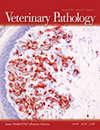大棕蝠组织和细胞中的大棕蝠γ疱疹病毒滋养特性,肺血管内巨噬细胞的潜在作用
IF 2.3
2区 农林科学
Q2 PATHOLOGY
引用次数: 0
摘要
γ疱疹病毒(γHVs)被认为是人类的重要病原体,但它们与其他动物宿主(尤其是野生动物物种)之间的关系却不太清楚。我们的目的是研究大棕蝠宿主中的天然大棕蝠γ疱疹病毒(EfHV)感染情况,并确定感染是否与疾病相关。在 132 只大棕蝠的组织样本中,有 41 只蝙蝠通过聚合酶链反应检测到了 EfHV DNA。对其中 59 例蝙蝠的组织进行了分析,包括 17 例检测到 EfHV 基因组的蝙蝠。从其中一个病例中获得了一个 EfHV 分离物,并通过电子显微照片和全基因组测序确认这是一个独特的 EfHV 分离物。虽然有几只蝙蝠出现了各种病变,但我们并未确定 EfHV 感染是病因之一。在淋巴组织细胞内发现了潜伏感染,即在没有病毒包膜糖蛋白探针结合的情况下,RNAScope探针与病毒潜伏相关核抗原结合。这些细胞还与靶向 CD20 mRNA 的 B 细胞探针共定位。在散布于肺泡毛细血管中的单个细胞中观察到了潜伏期相关核抗原和病毒糖蛋白的探针结合,这些细胞具有肺血管内巨噬细胞的特征。在蝙蝠肺中有类似分布的细胞表达主要组织相容性II类,这是抗原呈递细胞的标记,透射电子显微镜证实了蝙蝠肺血管内巨噬细胞的存在。这种细胞类型在γHVs感染中的重要性值得进一步研究。本文章由计算机程序翻译,如有差异,请以英文原文为准。
Tissue and cellular tropism of Eptesicus fuscus gammaherpesvirus in big brown bats, potential role of pulmonary intravascular macrophages
Gammaherpesviruses (γHVs) are recognized as important pathogens in humans but their relationship with other animal hosts, especially wildlife species, is less well characterized. Our objectives were to examine natural Eptesicus fuscus gammaherpesvirus (EfHV) infections in their host, the big brown bat ( Eptesicus fuscus), and determine whether infection is associated with disease. In tissue samples from 132 individual big brown bats, EfHV DNA was detected by polymerase chain reaction in 41 bats. Tissues from 59 of these cases, including 17 from bats with detectable EfHV genomes, were analyzed. An EfHV isolate was obtained from one of the cases, and electron micrographs and whole genome sequencing were used to confirm that this was a unique isolate of EfHV. Although several bats exhibited various lesions, we did not establish EfHV infection as a cause. Latent infection, defined as RNAScope probe binding to viral latency-associated nuclear antigen in the absence of viral envelope glycoprotein probe binding, was found within cells of the lymphoid tissues. These cells also had colocalization of the B-cell probe targeting CD20 mRNA. Probe binding for both latency-associated nuclear antigen and a viral glycoprotein was observed in individual cells dispersed throughout the alveolar capillaries of the lung, which had characteristics of pulmonary intravascular macrophages. Cells with a similar distribution in bat lungs expressed major histocompatibility class II, a marker for antigen presenting cells, and the existence of pulmonary intravascular macrophages in bats was confirmed with transmission electron microscopy. The importance of this cell type in γHVs infections warrants further investigation.
求助全文
通过发布文献求助,成功后即可免费获取论文全文。
去求助
来源期刊

Veterinary Pathology
农林科学-病理学
CiteScore
4.70
自引率
8.30%
发文量
99
审稿时长
2 months
期刊介绍:
Veterinary Pathology (VET) is the premier international publication of basic and applied research involving domestic, laboratory, wildlife, marine and zoo animals, and poultry. Bridging the divide between natural and experimental diseases, the journal details the diagnostic investigations of diseases of animals; reports experimental studies on mechanisms of specific processes; provides unique insights into animal models of human disease; and presents studies on environmental and pharmaceutical hazards.
 求助内容:
求助内容: 应助结果提醒方式:
应助结果提醒方式:


